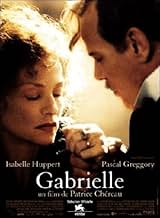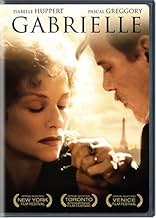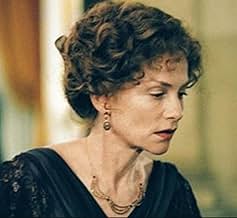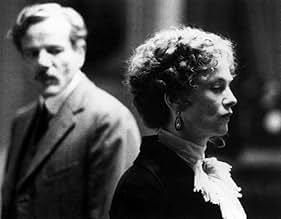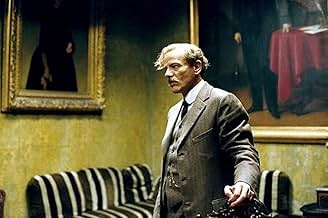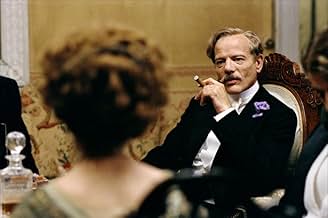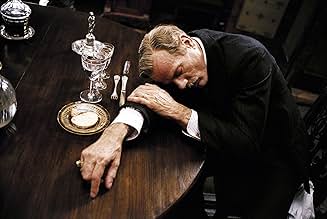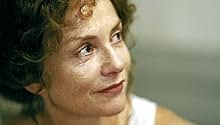Gabrielle
- 2005
- 1h 30m
IMDb RATING
6.2/10
2.2K
YOUR RATING
The marriage between Gabrielle and Jean begins to fray after the discovery of a letter that belongs to Gabrielle.The marriage between Gabrielle and Jean begins to fray after the discovery of a letter that belongs to Gabrielle.The marriage between Gabrielle and Jean begins to fray after the discovery of a letter that belongs to Gabrielle.
- Director
- Writers
- Stars
- Awards
- 3 wins & 6 nominations total
Florent Bigot de Nesles
- Invité
- (uncredited)
Philippe Calvario
- Guest
- (uncredited)
- Director
- Writers
- All cast & crew
- Production, box office & more at IMDbPro
Featured reviews
Based on "The Return" by Joseph Conrad, "Gabrielle" tells the story of a woman in turn-of-the-century Paris who rebels against a loveless marriage.
Jean Hervey is a successful newspaper publisher whose life is ruled far more by social obligation and ritual than by emotion or passion. He extends this philosophy to all areas of his life, even to his own wife, whom he sees less as a person with a basic human need for intimacy and passion than as an attractive ornament to be placed beside all the other artwork in his impressive collection of Greek statuary. He even proclaims rather proudly - as if it were evidence of his imperviousness to the weakness of the flesh - that, though he and his wife do share the same bedroom, they sleep in different beds. Yet, he is not above deluding himself into believing that he actually loves her, although he is the first to admit that real love requires far too much effort to really be worth his time. He takes pride in her "placid" nature, which he feels serves him well in her function as hostess for the dinner parties he throws for his friends like clockwork every Thursday night. One day, however, Jean's studiously ordered world is shattered when he finds a note from Gabrielle informing him that she has run off with another man. A few moments later, though, Gabrielle mysteriously returns home, having been unable to make that final break for reasons not entirely fathomable either to herself or to us. The remainder of the film is spent examining the couple's efforts to cope with the situation.
This theme - of an aristocratic, free-spirited woman trapped in a figurative gilded cage by either the man in her life or society as a whole - was not exactly a novel one even at the time the story was written, but what separates "Gabrielle" from similar works is its unique concentration on the man instead of the woman, on HIS repression and inadequacies rather than hers. This leads to a conclusion rich in irony as Jean, the passionless purveyor of propriety, becomes ever more eaten up by his own jealousies and obsessions. Jean reveals much of what he's thinking through voice-over narration, as Gabrielle serves as a catalyst for his own emotional revolution.
If "Gabrielle" reminds us of anything, it is of a film by Ingmar Bergman, one in which the characters talk out the minutiae of their relationships and their innermost feelings and thoughts at almost agonizing length - tedious to some in the audience, perhaps, but fascinating to others. Patrice Chereau and Anne-Louise Trividic's literate screenplay plumbs the depths of the two souls involved, while Chereau's direction keeps things moving by employing a camera that sweeps with almost reckless abandon through the dusky rooms and crowded salons where the action takes place.
Isabelle Huppert and Pascal Greggory are perfectly cast foils as the husband and wife for whom "love" is no longer a viable option. Each of the actors seethes with an intensity that reveals the passions that have long lain dormant under the couple's placid exteriors.
Although Gabrielle may be the first of the two to throw off the cloak of respectability and go for what really matters, it is Jean's intense struggle with his own inner demons that commands most of our attention. For despite the title being "Gabrielle," the film turns out to be much more Jean's story in the end than hers.
Jean Hervey is a successful newspaper publisher whose life is ruled far more by social obligation and ritual than by emotion or passion. He extends this philosophy to all areas of his life, even to his own wife, whom he sees less as a person with a basic human need for intimacy and passion than as an attractive ornament to be placed beside all the other artwork in his impressive collection of Greek statuary. He even proclaims rather proudly - as if it were evidence of his imperviousness to the weakness of the flesh - that, though he and his wife do share the same bedroom, they sleep in different beds. Yet, he is not above deluding himself into believing that he actually loves her, although he is the first to admit that real love requires far too much effort to really be worth his time. He takes pride in her "placid" nature, which he feels serves him well in her function as hostess for the dinner parties he throws for his friends like clockwork every Thursday night. One day, however, Jean's studiously ordered world is shattered when he finds a note from Gabrielle informing him that she has run off with another man. A few moments later, though, Gabrielle mysteriously returns home, having been unable to make that final break for reasons not entirely fathomable either to herself or to us. The remainder of the film is spent examining the couple's efforts to cope with the situation.
This theme - of an aristocratic, free-spirited woman trapped in a figurative gilded cage by either the man in her life or society as a whole - was not exactly a novel one even at the time the story was written, but what separates "Gabrielle" from similar works is its unique concentration on the man instead of the woman, on HIS repression and inadequacies rather than hers. This leads to a conclusion rich in irony as Jean, the passionless purveyor of propriety, becomes ever more eaten up by his own jealousies and obsessions. Jean reveals much of what he's thinking through voice-over narration, as Gabrielle serves as a catalyst for his own emotional revolution.
If "Gabrielle" reminds us of anything, it is of a film by Ingmar Bergman, one in which the characters talk out the minutiae of their relationships and their innermost feelings and thoughts at almost agonizing length - tedious to some in the audience, perhaps, but fascinating to others. Patrice Chereau and Anne-Louise Trividic's literate screenplay plumbs the depths of the two souls involved, while Chereau's direction keeps things moving by employing a camera that sweeps with almost reckless abandon through the dusky rooms and crowded salons where the action takes place.
Isabelle Huppert and Pascal Greggory are perfectly cast foils as the husband and wife for whom "love" is no longer a viable option. Each of the actors seethes with an intensity that reveals the passions that have long lain dormant under the couple's placid exteriors.
Although Gabrielle may be the first of the two to throw off the cloak of respectability and go for what really matters, it is Jean's intense struggle with his own inner demons that commands most of our attention. For despite the title being "Gabrielle," the film turns out to be much more Jean's story in the end than hers.
I've been watching & thoroughly enjoying Isabelle Huppert's films since 'The Lacemaker'. This time, what struck me was the intensity of Huppert's next-to-passive, almost casually indifferent postures of contempt for her husband. It is because of her being so minimal and apathetic that her performance harnesses its power and devastation. And this is what enhances Greggory's reactive performance as being so complementary, that of a once smug now tortured soul who slips and struggles to re-grasp a heart turned cold. He's just left grabbing air in the end. The looks on the faces of the chorus, their social clique & the servants in the troubled Hervey household says it all.
Going in, I was reminded of another story of martial discord, David Hughes Jone's 'Betrayal' but 'Gabrielle' hit me as being more incisive and oppressive than anything I've seen adapted for Pinter. I don't need to state the obvious that parlor films of this variety appeal only to those with an acquired taste. As for me, I can only say that I prefer the ice cubes that go with my scotch jagged & stinging cold like the ingredients in this film.
Going in, I was reminded of another story of martial discord, David Hughes Jone's 'Betrayal' but 'Gabrielle' hit me as being more incisive and oppressive than anything I've seen adapted for Pinter. I don't need to state the obvious that parlor films of this variety appeal only to those with an acquired taste. As for me, I can only say that I prefer the ice cubes that go with my scotch jagged & stinging cold like the ingredients in this film.
This up close study of a marriage in crisis is Chereau at his subtle, rich best. The infant terrible of '82 Bayreuth has matured into a maestro of cinema.
Gabrielle wants more but is unwilling to spend the effort or pay the price to get it. Her husband wants less and will settle for nothing less than less. The machinery of their marriage was running so flawlessly that it required no work by either and only modest attention. Their relations were on automatic pilot and they both seemed massively content to keep it that way. Then the machinery, briefly but ruinously, goes crazy.
Huppert and Greggory are riveting. And, not counting the credits, run time is less than 90 minutes. Good artistic judgment there by Chereau. Any longer and this film could be painful for the viewer. Jim Smith
Gabrielle wants more but is unwilling to spend the effort or pay the price to get it. Her husband wants less and will settle for nothing less than less. The machinery of their marriage was running so flawlessly that it required no work by either and only modest attention. Their relations were on automatic pilot and they both seemed massively content to keep it that way. Then the machinery, briefly but ruinously, goes crazy.
Huppert and Greggory are riveting. And, not counting the credits, run time is less than 90 minutes. Good artistic judgment there by Chereau. Any longer and this film could be painful for the viewer. Jim Smith
Obviously we don't all like the same things. One commentator said it was all just talk, as if that were a bad thing. I happen to love language and words, and in particular love the French language. So that is the reason I rent a movie in French. I also have a very strong aversion to "action movies" where language is reduced to "Ow! Help! Duck!" On the other hand, movies like Gabrielle where minute movements of the psyche are explored in depth by minimalistic means, these are what grip me, move me, keep me interested. I do not really think the movie is like an opera -- it was more like a french play -- the delivery and velocity of the spoken word was very much in the style of french live theater.
My only caveat is that French-ness and Conrad seem a strange mix to me. There was another French movie that was made on a Conrad text, and I had a similar reaction. Conrad is not writing about French society. And yet the action has been transplanted to France. And it seems an entirely incongruous transplant to me -- plopping the joyless uprightness of puritanical England (the only place name mentioned is "West End Station" into a such a lively Latin culture which has always had a much more relaxed attitude towards love and sex... well,to me it's just incongruous.
Nevertheless, it was an cleverly crafted movie, and the musical score by Fabio Vacchi was unearthly beautiful.
My only caveat is that French-ness and Conrad seem a strange mix to me. There was another French movie that was made on a Conrad text, and I had a similar reaction. Conrad is not writing about French society. And yet the action has been transplanted to France. And it seems an entirely incongruous transplant to me -- plopping the joyless uprightness of puritanical England (the only place name mentioned is "West End Station" into a such a lively Latin culture which has always had a much more relaxed attitude towards love and sex... well,to me it's just incongruous.
Nevertheless, it was an cleverly crafted movie, and the musical score by Fabio Vacchi was unearthly beautiful.
I saw this dark oeuvre yesterday at the Boston French Film Festival at the MFA.It was chosen to be the Opening night Film and was sold out.The director was present and spoke at length about what drew him to make the film and what was important about it- for him. I felt the film-making was fascinating. From the opening sequence, where the footage in the train station is SO realistic in its early 20th c. appearance, and throughout the film, I found the cinematography to be lush, stylized, extremely well-framed and riveting .It is a perfect voice for the story. The actors are always IN YOUR FACE and this fact, combined with an economic and well written script, heavy dark music, tremendously accurate and effective set design, and spot-on acting, made for an extremely moving and interesting exploration of the story. For me, in tone and context, it felt a bit like Henry James' Portrait of a Lady (and probably works by Ibsen and others) Isabelle Huppert and her husband are extremely wealthy, cold, unemotional,detached from themselves and others, and 'safe' in that world. Their house-where 99% of the film takes place, is a dark, heavy, classical, structured prison.(The director's background in stage directing is very evident in this film.) One little bubble bursts from that prison and then things change and the disintegration begins. It gives one a great deal to think about. My only problem with the film is the MUSIC.The music is as much an element of the film as the actors. That is not, in and of itself, a bad thing, but in the last 20 minutes of the film, it is just WAY TOO MUCH: too heavy, too loud, and too repetitive;a bit like Bruchner at his worst. But if you are able to see a DVD of this, you can turn down this overkill. If you are lucky enough to see the film live (so important for major artistic cinematography like this) you'll just have to deal with it; maybe it won't bother you so much.At any rate, the film will provide those so inclined with many things to think about and discuss. And visuals to remember. For me,I will always carry the image of Huppert, dressed in black, on that enormous settee... it's a Degas.
Did you know
- ConnectionsReferenced in New York - Section criminelle: Blind Spot (2006)
- How long is Gabrielle?Powered by Alexa
Details
Box office
- Gross US & Canada
- $332,829
- Opening weekend US & Canada
- $30,676
- Jul 16, 2006
- Gross worldwide
- $2,775,311
- Runtime
- 1h 30m(90 min)
- Color
- Sound mix
- Aspect ratio
- 2.35 : 1
Contribute to this page
Suggest an edit or add missing content

